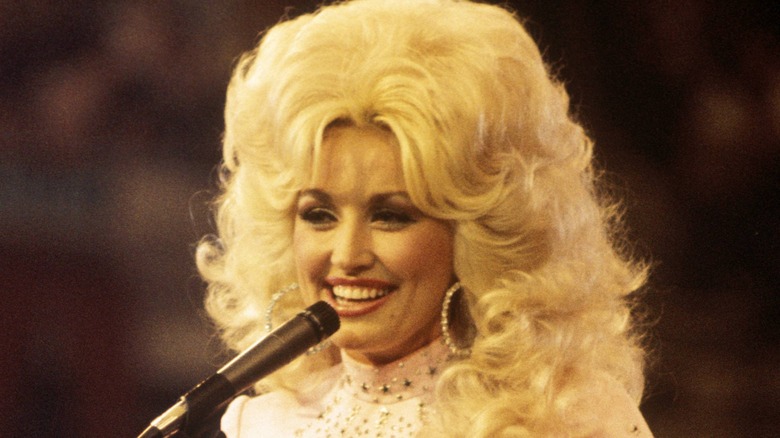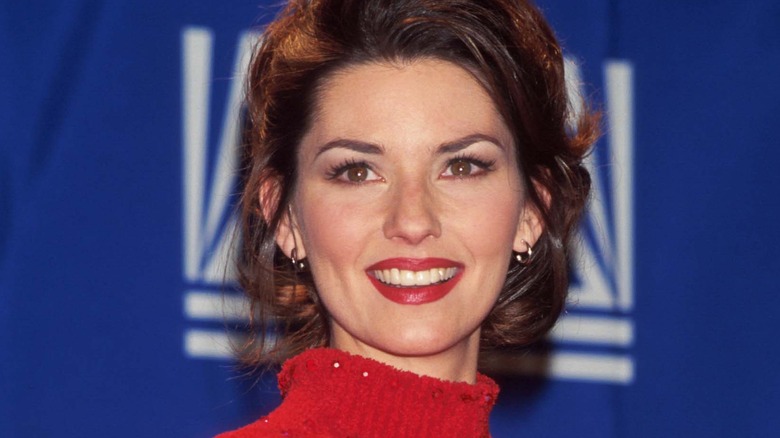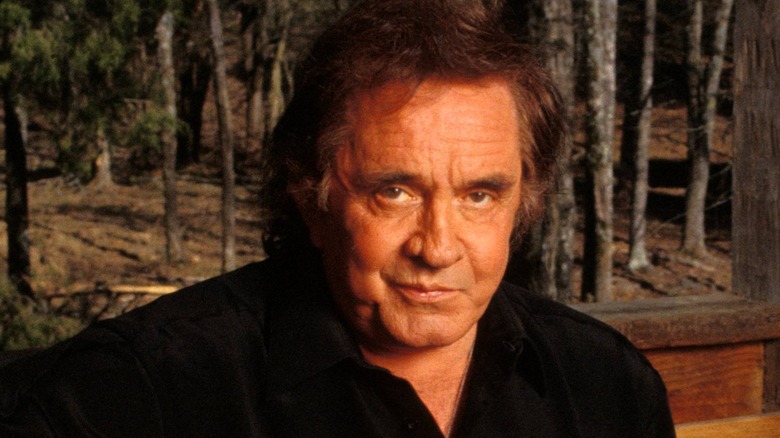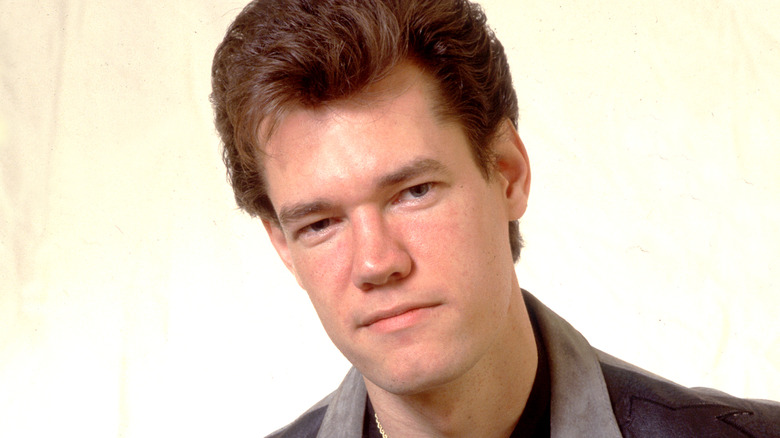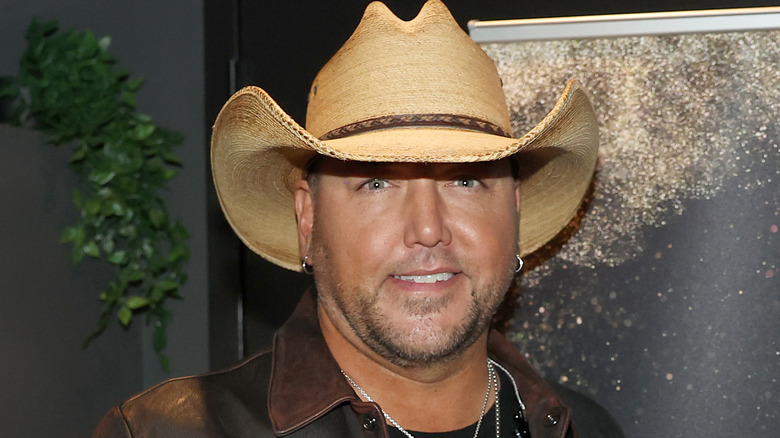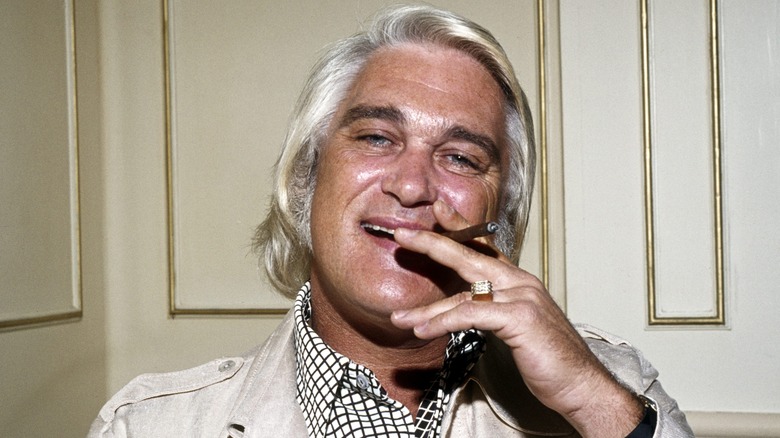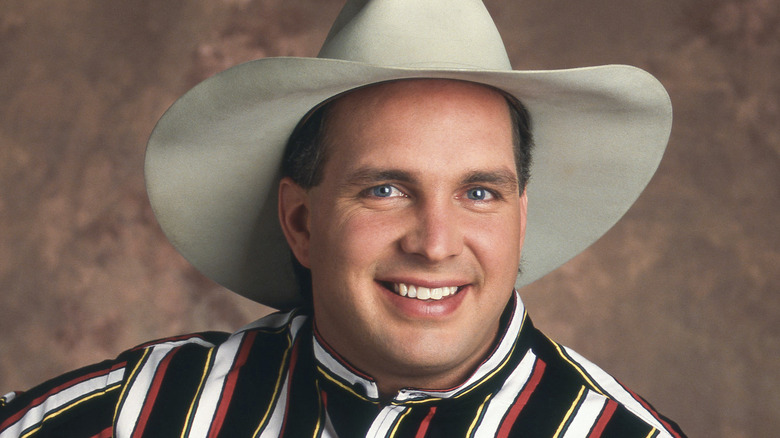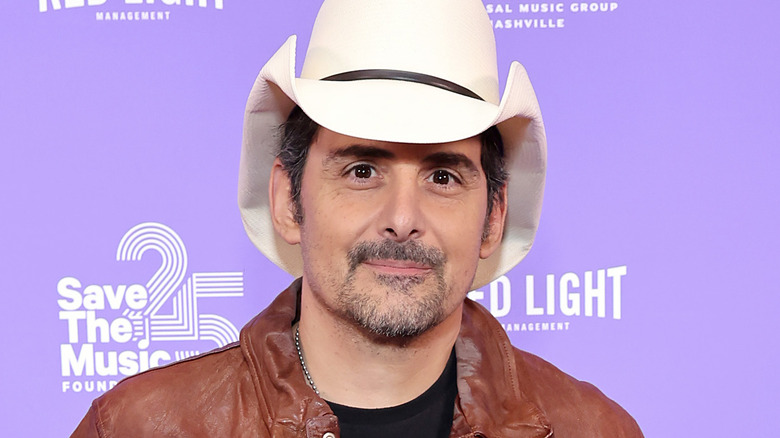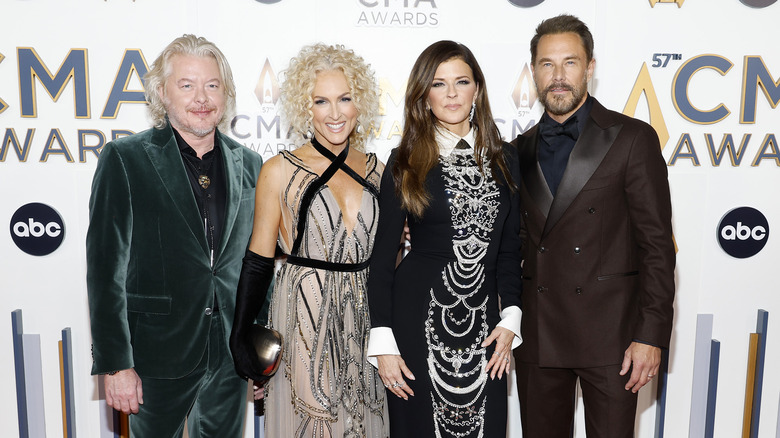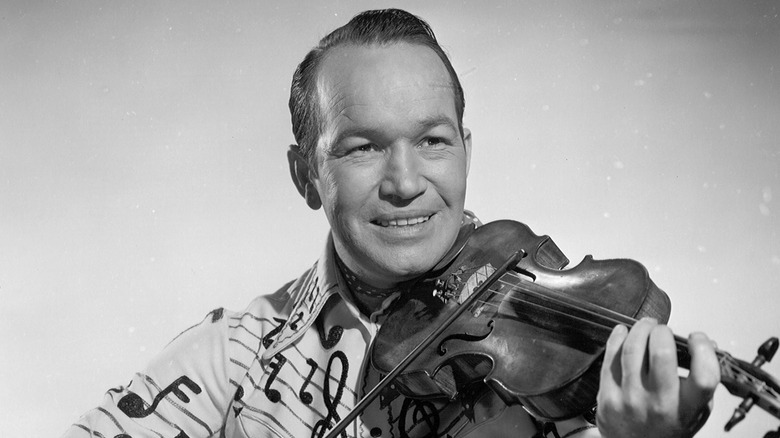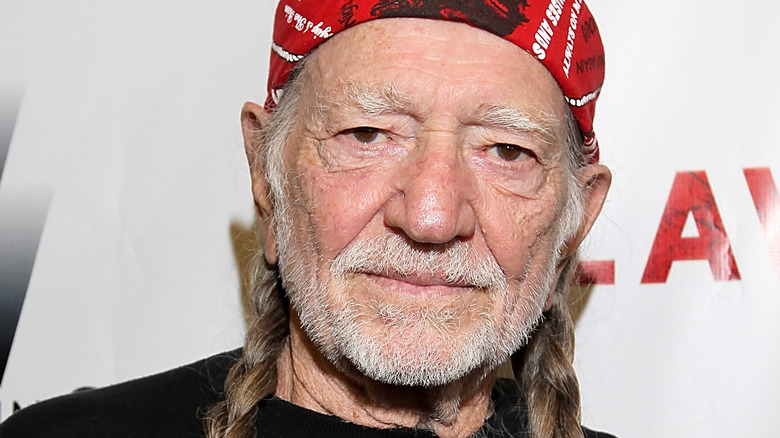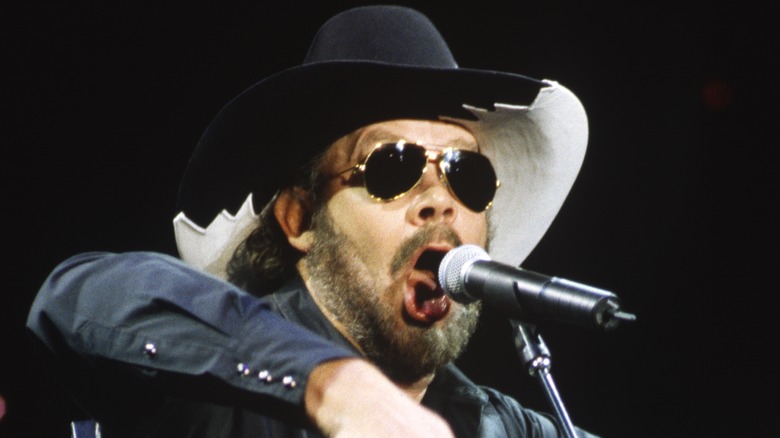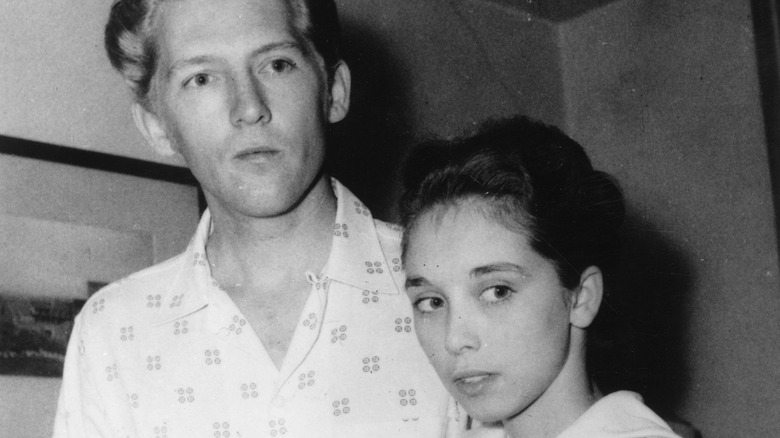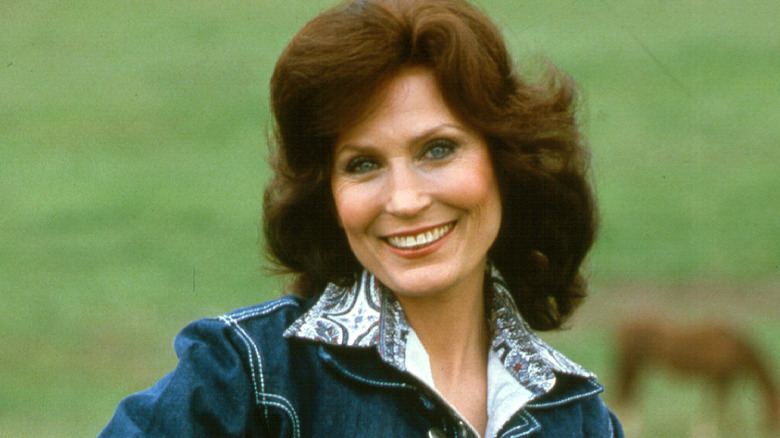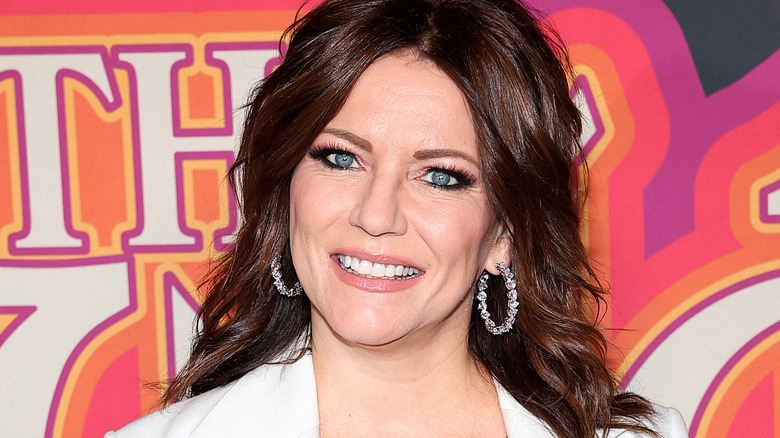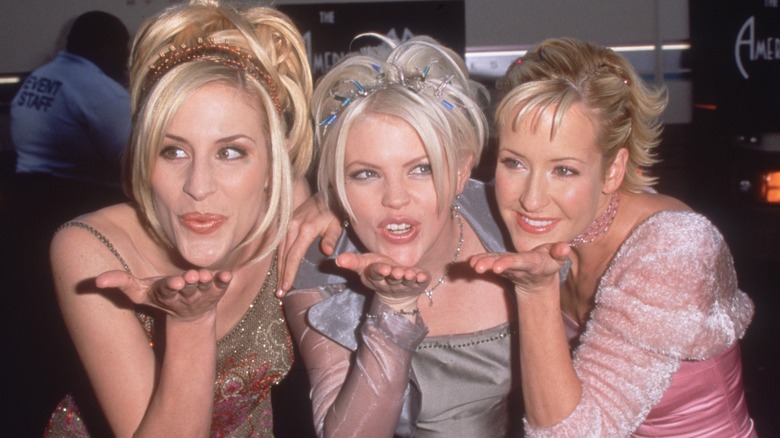The Biggest Scandals To Rock Country Music
Of all the contemporary, popular forms of American music, country is the most conservative and content with life. More so than pop, rock, or hip-hop, country music and its biggest acts generally don't rock the boat too much and compose and perform songs about how the simpler life is, the better it can be. That's why when controversy occasionally emerges from the country music industrial entertainment machine, it seems to hit harder and feel all the more scandalous and tawdry.
From when its tropes solidified and it became a national force in the 1940s and up through to the present day, country music has generated countless stars. And some of its biggest names and most prominent hitmakers have been taken down by scandal, or had their personal or professional lives temporarily or irreparably damaged by some bad decisions, untoward actions, or unfortunate circumstances. Here are the most shocking, the darkest, and the most boot-shaking moments in the otherwise outwardly upstanding history of American country music.
Dolly Parton went solo and got sued
In 1967, Dolly Parton landed a national country hit with "Dumb Blonde." By the end of the year, she was starring as the main female vocalist on the syndicated country-themed variety program "The Porter Wagoner Show." That weekly, highly visible platform launched Parton to mega-fame, but the grind became too much for the singer. "Those seven years of being with Porter, it was damn near like being married to him," Parton wrote in "Songteller: My Life in Lyrics." "You're working together and putting in your creative self, putting in every emotion that you have."
In 1974, Parton emphatically launched her solo era by leaving "The Porter Wagoner Show." To mark the transition, and as a genuine demonstration of gratitude for all he did to help her professionally, Parton wrote "I Will Always Love You" in Wagoner's honor. The ballad topped the country singles chart in 1974 (and again in 1982, and Whitney Houston's cover spent 14 weeks atop Billboard's pop chart in the '90s), but the lyrics apparently didn't much soothe Wagoner, bitter over her exit from his program. "After I left and started doing well, Porter sued me for $1 million, and that was money that I didn't have," Parton wrote of the successful contract breach suit. "I had to pay that over a long period of time. But you have to forgive and forget."
Shania Twain's spousal switch
Mutt Lange is among a handful of music producers whose name is well known, but that's probably because he oversaw some of the best-selling albums of all time. After producing AC/DC's "Back in Black," Def Leppard's "Hysteria," and Bryan Adams' "Waking Up the Neighbors," he took a gig behind the console for "The Woman in Me," the sophomore album by Canadian pop-country singer Shania Twain. Her first album didn't sell very well, but "The Woman in Me" did; thanks in part to Lange's signature radio-friendly sheen, the LP sold more than 10 million copies and made Twain a country superstar. The producer and the singer weren't just professional partners, but romantic ones, too — they married in December 1993.
The pair worked together and raised a son, until everything ended with an announced separation in May 2008 and a subsequent divorce. Twain's confidante and champion during that traumatic time: businessman Frédéric Thiébaud. They met in the mid-1990s after Twain employed Marie-Anne, Thiébaud's wife, to be a nanny and housekeeper. Twain and Marie-Anne Thiébaud enjoyed a tight friendship, and the four adults would enjoy vacations and holidays with one another. Then Twain learned that Lange and Marie-Anne were having a tryst. "The person to comfort me was Fred because he's been through the exact same thing," Twain said on "The Oprah Winfrey Show." Commiserating over their spouses hooking up brought Twain and Thiébaud together. They got married in 2011.
When Johnny Cash was banned from the Grand Ole Opry
Something of a rebel in country music, Johnny Cash would become one of the style's most famous practitioners. An inductee into both the Country Music Hall of Fame and the Rock and Roll Hall of Fame, the "Man in Black" had sent seven singles to No. 1 on Billboard's country singles chart by the time he played at the Grand Ole Opry in Nashville in 1965. It wasn't the first time he took the stage for the nationally broadcast country show, but it would be the last time he'd play the storied venue for a while.
By 1965, Cash was addicted to amphetamines and barbiturates. "I wanted to get just about that high off the ground before I'd go onstage," he told "60 Minutes" in 1982. "Sometimes, I'd misjudge how high I was, you know, and I'd get onstage and I was a wreck." Case in point: During his 1965 appearance, Cash grew so agitated as a result of the drugs that he used his microphone stand to smash all of the stage lights he could reach. "They said they couldn't use me anymore," Cash explained. "So I left and used that as an excuse to really get wild and wound up in the hospital with my third time I broke my nose." Cash would eventually achieve sobriety, and he was un-banned from the Opry in 1968.
Morgan Wallen used a racial slur on camera
Shortly after releasing his second LP, the chart-topping "Dangerous: The Double Album," in 2021, country singer-songwriter Morgan Wallen instantly set his career back and painted himself as a villain. Tabloid TMZ acquired and posted video footage of the musician using a racial slur. After a night of partying in Nashville, Wallen was seen returning to his home, yelling loudly with and at his friends. It irritated a neighbor, who picked up a camera. Along with jovially calling one pal a "motherf***er," he called another a "n*****."
Within the week, Wallen's label, Big Loud, put a hold on the musician's contract. The iHeartRadio consortium of radio stations pulled Wallen's songs, including those from what was at the time the No. 1 album in the U.S. Country Music Television instituted a ban on Wallen, too. "After learning of Morgan Wallen's racial slur late last night, we are in the process of removing his appearances from all our platforms," a CMT representative said in a statement (via NBC News).
"I'm embarrassed and sorry. I used an unacceptable and inappropriate racial slur that I wish I could take back," Wallen told TMZ. "I promise to do better." Other country stars weighed in on X, known as Twitter at the time. "The news out of Nashville tonight does not represent country music," wrote Kelsea Ballerini. Mickey Guyton, a Black country singer, added, "The hate runs deep."
When Randy Travis was found drunk, disorderly, and derobed
Generally a stoic musical traditionalist, Randy Travis made headlines for two alcohol-related arrests in one year. In February 2012, a police officer in Sanger, Texas, noticed a vehicle out of place outside a church. There he found Travis, a resident of nearby Tioga, in the driver's seat, smelling of alcohol and sitting next to an open bottle of wine. Travis was charged with public intoxication and was housed in the county jail for several hours. "I'm committed to being responsible and accountable, and apologize for my actions," Travis said in a statement a few hours after his release (per The Washington Post).
Six months later, Travis entered a Tioga convenience store to buy cigarettes. He reportedly left in a state of agitation when the clerk asked for a form of payment — which Travis didn't have, and also he was naked at the time. The worker called 911 to report the incident, just before the dispatch fielded another call from an individual who came across a man lying in the road near a vehicle. That was Travis, and after he refused field sobriety tests, he was arrested by state police. Booked on suspicion of driving while intoxicated, an upset Travis told the state troopers he'd shoot them to death, resulting in another charge, retaliation. Travis posted bond and was released, and in 2019 admitted that not only had he been under the influence of alcohol, but the powerful sleep drug Ambien as well.
Jason Aldean took a pro-mob justice tune to No. 1
In 2023, Jason Aldean released "Try That in a Small Town." Created by four other writers, the song paints an image of a tiny American burg where crimes and perceived offenses are punished quickly and extra-judiciously by gun-toting citizens. "See how far you make it down the road, around here, we take care of our own," Aldean sings after listing actions like spitting in the face of a police officer, burning a flag, robbing a liquor store, and stealing a car. "I recommend you don't try that in a small town," the song threatens.
The video for "Try That in a Small Town" reiterated the message with some politically charged imagery. Aldean mimed playing the song by a courthouse where a Black man was once lynched, and the clip also includes footage of Black Lives Matter protests, presented as one of the things one shouldn't theoretically try in a small town. After receiving numerous complaints, CMT removed the video from rotation. "If you've got common sense, you can look at the video and see I'm not saying anything that's not true," Aldean said on the "Coop's Rockin' Country Saturday Night" podcast (via Deadline). Despite the controversy, "Try That in a Small Town" reached No. 1 on both Billboard's country and pop charts.
Faith Hill hated to lose
Already an elite performer in country since the 1990s, Faith Hill sure seemed like she had a major shot at taking home the Female Vocalist of the Year prize at the 2006 Country Music Association Awards. After all, her sixth studio album, "Fireflies," had topped the charts and generated big hit singles including "Mississippi Girl," "Like We Never Loved at All," and "Sunshine and Summertime." But when she didn't win Female Vocalist of the Year, apparently no one was more surprised than Hill herself.
From the stage, presenter Miley Cyrus announced the winner: recent "American Idol" champion and instant country superstar Carrie Underwood. Broadcast producers had cameras trained on each of the present nominees. Evidently expecting to hear her own name, Hill shot up her arms in victory then realized Cyrus hadn't actually said "Faith Hill." Her facial expression turned to one of surprised anger and while not heard, her lips clearly blurted out, "What?!"
After the ceremony, and Hill's instantly viral moment, the singer and her team went into damage control mode, attempting to frame the reaction as a joke. "The idea that I would act disrespectful towards a fellow musician is unimaginable to me," Hill said in a statement (via The Washington Post). "She was being playful while the nominations were being read and playful after," Hill's manager Gary Borman added.
Charlie Rich flamed John Denver
Being voted the Entertainer of the Year at the Country Music Association Awards is a major honor. Among those who've received the accolade: Johnny Cash, Loretta Lynn, George Strait, and in 1974, Charlie Rich. At the 1975 CMA Awards, organizers asked Rich to hand out the prize to the new winner, a passing of the torch that the country superstar took literally. Rich opened the envelope he was given, and announced that the winner was John Denver, a mid-1970s superstar more aligned with folk and pop than country. Sarcastic commentary on that fact was implied by Rich's behavior. "The winner," Rich said, before taking out a lighter and setting the paper aflame to peals of laughter from the crowd, "my friend, Mr. John Denver." The broadcast then cut to Denver, via satellite, gracious and unaware of Rich's actions.
In a since-deleted website post, Charlie Rich Jr. offered several excuses and justifications on behalf of his father. The elder Rich had apparently just fractured multiple foot bones and was heavily medicated during the CMA Awards. "Secondly, he and another country star got to drinking Gin and Tonics while waiting in the dressing room. The show was long, so by the time Dad was supposed to go on, the drinks on top of the medication got him buzzed," Rich Jr. said (via Saving Country Music), also suggesting that his father set Denver's name ablaze because, "He thought it would be funny."
Garth Brooks' many bans
Garth Brooks sold more than 95 million albums in the 1990s and is the top-selling solo artist of all time. Nevertheless, he weathered some potentially career-withering scandals. In 1991, he released the single "The Thunder Rolls," a song about a cheated-on, physically abused wife who takes revenge on her husband with homicide. The video for the song graphically depicted domestic abuse (and starred Brooks as the villainous husband), and the two biggest country music TV outlets at the time, The Nashville Network and Country Music Television, refused to put it in rotation. "This is real life," Brooks told Entertainment Weekly. "Where I'm from, people aren't afraid to talk about it." Anti-abuse charities around the county came to Brooks' defense, and after pop channel VH1 agreed to air it, "The Thunder Rolls" went to No. 1 on the country chart.
A little over a year later, Brooks' string of 13 consecutive country Top 10 hits was broken when a large number of radio stations refused to air "We Shall Be Free." An anthemic urging for unity and tolerance, programmers balked at the lyric "When we're free to love anyone we choose," because of its implied support of the LGBT community.
Brad Paisley's Accidental Racist was accidentally racist
Generally a singer-songwriter of crowd-pleasing, fun-loving, humor-injected hits like "Online" and "Start a Band," country star Brad Paisley at least tried to open up the conversation and inspire some musical genre-blending with his 2013 single "Accidental Racist." Paisley, who co-wrote the song, sings from the point of view of a white Southern man trying to express his pride for where he's from — by displaying Confederate flag imagery — while also not wanting anyone to think he supports Confederate ideas like slavery or institutionalized racism. He admits that he's "got a lot to learn," before LL Cool J delivers a guest verse that encourages a dialogue about racial issues via leading by example. "If you don't judge my do-rag," LL Cool J raps, "I won't judge your red flag. If you don't judge my gold chains, I'll forget the iron chains."
Paisley and LL Cool J earned criticism for being so dismissive of something as brutal as slavery. "It's pretty insane to compare an inoffensive piece of headgear to a flag that represents a treasonous secession movement [devoted] to maintaining the practice of slavery," wrote David A. Graham in The Atlantic. "It's even more insane to compare jewelry to, you know, slave shackles."
No Girl Crush allowed
According to Dictionary.com, a "girl crush" refers to a "non-romantic admiration that one woman has for another." A fun and playful way for a woman (or anyone) to publicly declare their platonic appreciation for another, the 2010s-hitting slang term notably morphed into a weekly "Woman Crush Wednesday" proclamation on social media platforms. In 2015, country group Little Big Town jumped on the trend with "Girl Crush," told from the point of view of a woman with complicated feelings toward her former lover's new female partner. Some lyrics, according to The Hollywood Reporter: "I want her long blond hair, I want her magic touch, yeah, 'cause maybe then you'd want me just as much, I got a girl crush."
Some country fans didn't notice or appreciate the nuance. Boise country radio DJ Alana Lynn told The Washington Post that soon after she started playing "Girl Crush," her station received numerous angry calls and boycott threats because the Little Big Town song was supposedly "promoting the gay agenda." Lynn's station, like many others across the U.S. that received similar complaints, took the song off its playlists. "Girl Crush" hit No. 4 on iTunes singles sales charts but couldn't muster the radio support that would usually accompany such demonstrable popularity.
Spade Cooley murdered his wife
In the 1940s and 1950s, when Western swing was a popular country music subgenre, fiddler and bandleader Spade Cooley was a major star. After hosting a local variety show in Santa Monica, California, in the 1940s, he became a national sensation. His first single, "Shame on You," spent nine weeks at No. 1 on the country chart, the first of half a dozen big hits that included "Detour" and "You Can't Break My Heart." In 1945, Cooley married his backup singer, Ella Mae Evans.
As country music evolved in the 1950s, Cooley's star power dimmed, and he descended into alcoholism and drug use. In 1961, after mutual infidelity, Evans proposed divorce. Days later, police in Kern County, California, arrested Cooley on a murder charge. Authorities believe that the musician had struck and beaten Evans until she was dead, in front of their 14-year-old daughter. Later in 1961, Cooley was convicted of murder and earned a life sentence, after entering and then withdrawing an insanity defense. After he repeatedly expressed remorse, a parole board was set to release Cooley in February 1970. In late 1969, the musician was given a 72-hour furlough to perform at a police event. He played, walked off the stage, and died of a heart attack.
Willie Nelson's tax scandal
As a highly familiar face and voice in country music, guitarist-songwriter-troubadour Willie Nelson has sold a lot of records, particularly in the 1970s and '80s. There was one big problem with all the revenue generated by the likes of "Whiskey River," "On the Road Again," "To All the Girls I've Loved Before," and his platinum-selling supergroup the Highwaymen: Nelson neglected to pay the taxes on it.
Nelson blamed his financial team for poor management of his fortune, particularly its investment in what turned out to be dubious tax shelters. In 1990, federal officials descended on Nelson-owned properties in six states and seized or confiscated things of value, including master recordings, musical equipment, gold and platinum album awards, and clothing. The IRS auctioned it off, looking to recoup some of the $32 million of Nelson's accumulated tax debt, of which $10.2 million came from penalties and interest. In 1993, Nelson and the IRS agreed to a $9 million settlement, of which the musician had already paid back $3 million. Some of that came from a 1992 album sold via infomercial, "The IRS Tapes: Who'll Buy My Memories?"
Hank Williams Jr. likened a president to Hitler
Son of foundational country musician Hank Williams, the much rowdier Hank Williams Jr. became a party-country icon with smash hits like "Whiskey Bent and Hell Bound" and "Family Tradition." Williams scored his most famous gig ever in 1989, when ABC hired him to remake his 1984 song "All My Rowdy Friends Are Coming Over Tonight" into the opening theme to its blockbuster "Monday Night Football" broadcasts.
The song served as a ritualistic weekly pump-up tune for more than two decades, kept around even when "Monday Night Football" moved to ESPN. Then in 2011, Williams was a guest on the Fox News talk show "Fox and Friends." The panel discussed how progressive President Barack Obama went golfing with conservative Speaker of the House John Boehner. Williams called the outing "one of the biggest political mistakes ever," per Rolling Stone. "It's like Hitler playing golf with Netanyahu," meaning Benjamin Netanyahu, prime minister of Israel. "They're the enemy," Williams said of Obama and then-vice president Joe Biden.
In a statement, ESPN said it was "extremely disappointed" with Williams' remarks and then dropped the singer's theme song from "Monday Night Football." Williams apologized via a press release (via CNN). "The thought of the leaders of both parties jukin' and high fiven' [sic] on a golf course, while so many families are struggling to get by, simply made me boil over and make a dumb statement, and I am very sorry if it offended anyone," he wrote.
When Jerry Lee Lewis married his underage cousin
Rock 'n' roll emerged in part out of country music, and so there was a lot of genre overlap in the 1950s. Jerry Lee Lewis straddled the line between the newfangled genre and its traditional predecessor, and was on his way to being a superstar before his controversial third marriage led to international distaste. Having scored massive hits with "Whole Lotta Shakin' Goin' On" and "Great Balls of Fire," in December 1957, Lewis, 22 and not technically divorced from his second wife, wed Myra Gale Brown. Not only was she his second cousin, she was also 13 years old. Their big debut as a couple came when Lewis brought Brown along on his 1958 U.K. tour. Upon landing at Heathrow Airport in London, reporters peppered the couple with questions — and Lewis lied and said that his new wife was 15.
The unseemly news reached back to the U.S. and killed Lewis' career momentum. His tour was canceled, DJs stopped playing his songs, and his appearance fee dropped from $5,000 a night to $350. Lewis and Brown divorced in 1970, with Brown reporting she'd been repeatedly abused throughout the marriage.
Loretta Lynn's Pill was hard to swallow
In a musical genre that rewards authenticity, Loretta Lynn became a country juggernaut. Largely autobiographical hit songs like "Blue Kentucky Girl" and "Coal Miner's Daughter" won Lynn many fans, although she lost a few in 1975 with the release of "The Pill," which was recorded in 1972 but shelved for three years. Lynn — who married at age 15 and had birthed four children by the age of 20 — co-wrote the song, a celebration of the birth control pill and the women's rights revolution it helped spawn. Reproductive rights were a hot button issue, however, and the conservative-and-religious-leaning country music establishment objected to "The Pill." It quickly peaked at No. 5 on Billboard's Hot Country Songs and then faltered when it lost a lot of airplay after radio stations started to ban it. However, pop fans curious about the scandal took "The Pill" to No. 70 on the pop-based Hot 100, the biggest crossover hit of Lynn's career.
The controversial taint on "The Pill" never fully disappeared. Despite Lynn's formidable standing as a country legend, the song still suffered a soft ban from country radio. In 2022, the year Lynn died and was widely memorialized, "The Pill" earned exactly one spin on terrestrial radio nationwide.
Tomato-gate tore country music apart
Keith Hill worked as a country radio consultant, advising stations on how and what to play to maximize listenership. In a 2015 interview with Country Aircheck, Hill revealed what he claimed to be the secret to success. "If you want to make ratings in country radio, take females out. Mainstream country radio generates more quarter hours from female listeners at the rate of 70 to 75%, and women like male artists," he said, urging stations to never play consecutive songs by female singers and then metaphorically comparing those musicians to salad adornments. "The lettuce is Luke Bryan and Blake Shelton, Keith Urban and artists like that. The tomatoes of our salad are the females."
According to The Tennessean, Hill's comments — branded "Tomato-gate" by the media — offered proof of perceived sexism in country radio. At the time of the consultant's remarks, only about a quarter of country radio's most-played songs were recorded by women."This posting is taking us 20 steps backwards. It's an insult to every female artist in the format," CMT executive Leslie Fram said. "I was taken aback by the comments in the article. I felt them to be sexist and condescending toward female artists," said Martina McBride, who ordered and distributed shirts bearing the word "Tomato." Irate fans showed up to the 2015 CMA Music Festival wearing shirts reading "Let the Tomatoes Play."
The Chicks vs. Bush
The bluegrass-inspired country trio then known as the Dixie Chicks (later dropping the first word for its antebellum connotation) became one of the biggest country acts of the late 190s and early 2000s. And then almost instantly in March 2003, the Texas-based group lost a lot of fans and the support of the country establishment. Just before the George W. Bush administration controversially invaded Iraq on the hard-to-prove auspice that the country was illegally harboring weapons of mass destruction, lead Chick Natalie Maines said during a London concert (per CNN), "Just so you know, we're ashamed the president of the United States is from Texas."
The fallout came quickly. The radio conglomerate Cumulus told its stations to no longer play any Chicks songs, and within two weeks of Maines' remarks, the Chicks single "Travelin' Soldier" fell from No. 1 on Billboard's country singles to off the chart completely. Maines clarified her remarks in a statement issued two days after the London concert (via CMT). "I feel the president is ignoring the opinions of many in the U.S. and alienating the rest of the world. My comments were made in frustration, and one of the privileges of being an American is you are free to voice your own point of view." Days later, Maines publicly apologized to President Bush. It took three years for radio to bring back the Chicks, just in time for their album "Not Ready to Make Nice," with a title track that references the death threats the musicians had received.
If you or anyone you know needs help with addiction issues or is dealing with domestic abuse, contact the relevant resources below:
- Visit the Substance Abuse and Mental Health Services Administration website or contact SAMHSA's National Helpline at 1-800-662-HELP (4357).
- Call the National Domestic Violence Hotline at 1−800−799−7233. You can also find more information, resources, and support at their website.

